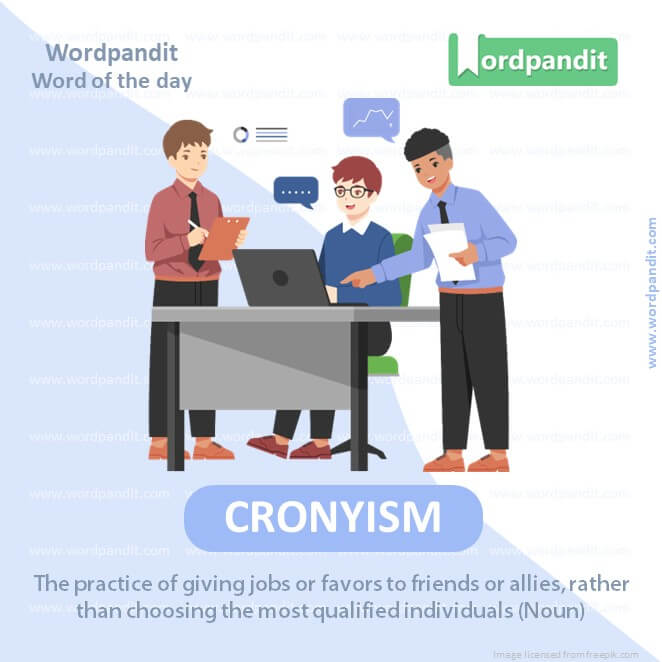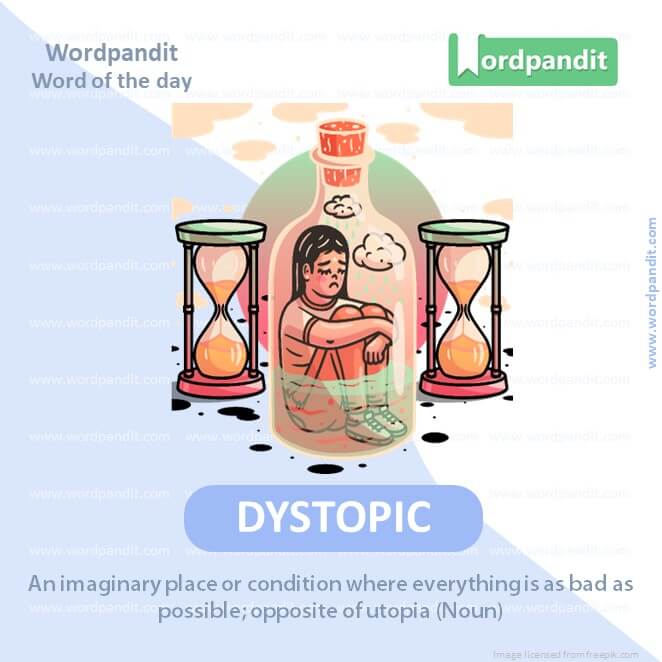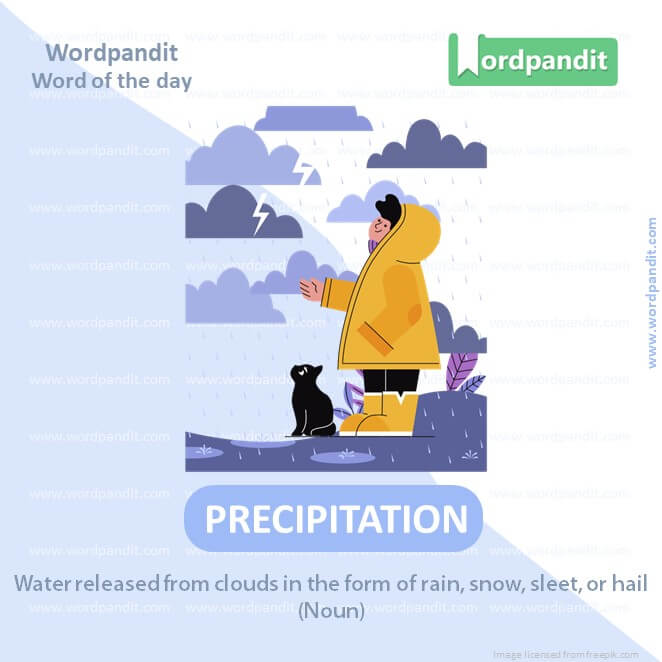Daily Vocabulary Words: List of Daily Used Words
Hi there. Welcome to this special section @ Wordpandit.
Our endeavour here is straightforward: highlighting important daily vocabulary words, you would encounter in The Hindu. This is your repository of commonly used words; essentially, we are posting a list of daily used words. Hence, this has significant practical application as it teaches you words that are commonly used in a leading publication such as The Hindu.
Visit the website daily to learn words from The Hindu.

WORD-1: CRONYISM
CONTEXT: The idea is unimplementable. It is nothing but a ‘distraction’ balloon floated to tide over the negative headlines about the Prime Minister’s cronyism and the Chinese President Xi Jinping’s snub to the G-20 summit.
SOURCE: The Hindu
EXPLANATORY PARAGRAPH: Imagine you have a group of best friends, and you always pick them when you’re playing a game, even if they’re not very good at it. You choose them because they’re your friends, not because they’re the best choice for the team. Cronyism is like that, but it’s not a good thing. In jobs or important decisions, picking only your friends isn’t fair to everyone else.
MEANING: The practice of giving jobs or favors to friends or allies, rather than choosing the most qualified individuals (Noun).
PRONUNCIATION: Kroh-nee-iz-uhm
SYNONYMS: Favoritism, Nepotism, Patronage, Partiality, Bias, In-group favoritism, Partisanship
USAGE EXAMPLES:
1. The company faced criticism for its cronyism in hiring practices.
2. The mayor was accused of cronyism after appointing his friends to important positions.
3. The school board vowed to eliminate cronyism in its decision-making.
4. The film industry has been plagued by cronyism for years.

WORD-2: DEVOURS
CONTEXT: This devours enormous financial resources and efforts, and the time of the government and political parties is the seeming concern.
SOURCE: The Hindu
EXPLANATORY PARAGRAPH: You know when you’re really, really hungry, and you eat your favorite meal super-fast? That’s like what “devours” means. It means to eat something up quickly and completely, like a lion eating its dinner.
MEANING: To eat something quickly and completely; to consume greedily (Verb).
PRONUNCIATION: Dee-vow-erz
SYNONYMS: Gobbles, Consumes, Gulps, Inhales, Wolf down, Engulfs, Polishes off
USAGE EXAMPLES:
1. The young boy devours his sandwich in minutes.
2. The fire quickly devours the dry forest.
3. She devours books, reading one almost every day.
4. The team devours the pizza as if they hadn’t eaten for days.

WORD-3: DYSTOPIC
CONTEXT: We are living in the age of moral dystopia, a norm-less era where it is difficult for men and women to be human and convenient for the state to be less than neutral, just, and fair.
SOURCE: The Hindu
EXPLANATORY PARAGRAPH: Imagine a world where everything is bad and unhappy, kind of like the opposite of a fairy tale. That’s called a dystopia. It’s a make-believe place where people are not free and everything is sad or scary.
MEANING: An imaginary place or condition where everything is as bad as possible; opposite of utopia (Noun).
PRONUNCIATION: Diss-toe-pee-uh
SYNONYMS: Nightmare, Hell, Abyss, Horror, Wasteland, Dark world, Bleakness
USAGE EXAMPLES:
1. The movie depicts a dystopia where people are not allowed to speak freely.
2. Many young adult novels are set in dystopian worlds.
3. Pollution could lead us towards a dystopia if we’re not careful.
4. He painted a dystopia where technology controls our lives.

WORD-4: SUSCEPTIBLE
CONTEXT: Women are more likely to live in poverty than men, which is just one of several social, economic, and cultural variables that makes them more susceptible to the effects of climate change.
SOURCE: The Hindu
EXPLANATORY PARAGRAPH: You know how some kids catch colds really easily? That’s because they’re “susceptible” to getting sick. Being susceptible means it’s easier for something to happen to you or affect you.
MEANING: Easily affected or influenced by something (Adjective).
PRONUNCIATION: Suh-sept-uh-bul
SYNONYMS: Vulnerable, Prone, Open, Sensitive, Exposed, Predisposed, Liable
USAGE EXAMPLES:
1. Children are often more susceptible to colds than adults.
2. The tourist areas are susceptible to pickpocketing.
3. Plants are susceptible to diseases if not properly cared for.
4. He is susceptible to flattery, which often clouds his judgment.

WORD-5: PRECIPITATION
CONTEXT: Changing precipitation patterns and more frequent extreme weather events are just the beginning of the problems.
SOURCE: The Hindu
EXPLANATORY PARAGRAPH: Precipitation is a big word that means water falling from the sky. It could be rain, snow, sleet, or hail. It’s like when you’re playing outside and suddenly you have to run inside because it started raining—that’s precipitation!
MEANING: Water released from clouds in the form of rain, snow, sleet, or hail (Noun).
PRONUNCIATION: Pree-sip-ih-tay-shun
SYNONYMS: Rainfall, Snowfall, Drizzle, Downpour, Shower, Flurries, Sleet
USAGE EXAMPLES:
1. The weather forecast predicts heavy precipitation for the weekend.
2. The area is known for high levels of precipitation throughout the year.
3. Snow is a form of precipitation.
4. The umbrella protects you from precipitation.
WORD-6: RESILIENT
CONTEXT: Investments in women’s education, training, and access to resources are essential if we are to be resilient to the impact of climate change.
SOURCE: The Hindu
EXPLANATORY PARAGRAPH: Imagine you’re a rubber band. When someone pulls you, you stretch, but then you snap right back to your original shape. Being resilient means, you can bounce back quickly when something tough or sad happens.
MEANING: Able to recover quickly from difficult situations (Adjective).
PRONUNCIATION: Reh-zil-yuhnt
SYNONYMS: Tough, Robust, Hardy, Strong, Buoyant, Unbreakable, Flexible
USAGE EXAMPLES:
1. She is resilient and always remains optimistic.
2. The resilient material can withstand heavy wear and tear.
3. The community was resilient after the natural disaster.
4. Resilient people often cope better with stress.
WORD-7: ERADICATING
CONTEXT: This plays a pivotal role in evaluating the extent of undernourishment at a more localised scale, which is critical for meeting the Sustainable Development Goals of eradicating hunger and malnutrition.
SOURCE: The Hindu
EXPLANATORY PARAGRAPH: Eradicating means getting rid of something completely, like when you clean your room so well that not even a single toy is out of place. It’s like zapping all the weeds in a garden so they never come back.
MEANING: To completely remove or eliminate something, usually something harmful (Verb).
PRONUNCIATION: Eh-rad-ih-kay-ting
SYNONYMS: Eliminating, Exterminating, Removing, Wiping out, Destroying, Abolishing, Expunging
USAGE EXAMPLES:
1. Scientists are working on eradicating malaria.
2. She focused on eradicating clutter from her life.
3. Eradicating poverty is a global goal.
4. The company is eradicating inefficiencies in its workflow.
WORD-8: EVASION
CONTEXT: But the festive effect would only be discernible two months from now. Yet, the overall trajectory of GST revenues, boosted by a crackdown on evasion and fake registrations, is buoyant and should dilute concerns about underwhelming collections in initial years of the tax.
SOURCE: The Hindu
EXPLANATORY PARAGRAPH: Evasion is when you try to avoid something on purpose. Like when someone asks you if you ate the last cookie, and you start talking about something else to avoid answering. It’s like dodging a question or situation.
MEANING: The act of avoiding something or someone, usually by deceit or cleverness (Noun).
PRONUNCIATION: Ee-vay-zhun
SYNONYMS: Avoidance, Dodging, Eluding, Escaping, Skirting, Shunning, Ducking
USAGE EXAMPLES:
1. His evasion of the question made everyone suspicious.
2. The criminal’s evasion from the police was short-lived.
3. She was skilled in the art of evasion during debates.
4. Evasion of responsibilities will lead to problems in the long run.
WORD-9: DISPROPORTIONATE
CONTEXT: This is why climate change has a disproportionate effect on rural women. Women in low-income countries (predominantly South Asia and sub-Saharan Africa) engage in climate-vulnerable occupations such as farming and other labour-intensive work.
SOURCE: The Hindu
EXPLANATORY PARAGRAPH: Imagine you have a big cake and a small cake. If you put a tiny cherry on the big cake and a big cherry on the small cake, that would be disproportionate. It means things are not balanced or not the right size compared to each other.
MEANING: Not in balanced relation to something else; lacking proportion (Adjective).
PRONUNCIATION: Diss-proh-por-shuh-nit
SYNONYMS: Unequal, Lopsided, Imbalanced, Skewed, Unfair, Asymmetrical, Mismatched
USAGE EXAMPLES:
1. The punishment seemed disproportionate to the crime.
2. There is a disproportionate number of men to women in the industry.
3. The artist intentionally used disproportionate shapes for effect.
4. She has a disproportionate fear of spiders compared to other animals.
WORD-10: EMPIRICAL
CONTEXT: However, it has not been able to provide empirical evidence to support its claims.
SOURCE: The Hindu
EXPLANATORY PARAGRAPH: Empirical means you know something because you saw it happen or tested it out, not just because someone told you or you guessed. For example, if you drop a ball and see it bounce, you have empirical evidence that balls bounce.
MEANING: Based on observation or experience rather than theory or pure logic (Adjective).
PRONUNCIATION: Em-peer-ih-kul
SYNONYMS: Observed, Experimental, Evidence-based, Factual, Tested, Practical, Hands-on
USAGE EXAMPLES:
1. The empirical data supports the scientist’s hypothesis.
2. His approach to solving problems is more empirical than theoretical.
3. The research provided empirical evidence for the new treatment.
4. She prefers empirical methods to study human behavior.
Vocabulary Synonyms
In the vast terrain of linguistics, ‘vocabulary synonyms’ serve as integral landmarks, enriching our language and enhancing communication efficiency. ‘Vocabulary synonyms’—words that carry the similar meanings—are essential linguistic tools that allow us to add depth, precision, and nuance to our conversations and writings. Learning vocabulary synonyms can thus significantly improve verbal and written communications.
To begin learning vocabulary synonyms, it is advisable to start with a word you are familiar with and search for its synonyms. For example, if the word ‘happy’ is well-known to you, look out for its synonyms like ‘joyful’, ‘elated’, ‘content’, and such. This approach helps you add more ‘vocabulary synonyms’ to your pool.
Moreover, utilizing synonyms dictionaries and vocabulary building apps can greatly assist in expanding your range of ‘vocabulary synonyms’. These resources provide a comprehensive list of synonyms for various words, thereby increasing your linguistic agility.
Using ‘vocabulary synonyms’ frequently in everyday communication is a practical way to get familiar with them. Replace common words with their synonyms in your speech and writing to experiment, aiding your mind to adapt to the newer, richer vocabulary.
Reading extensively and purposefully is also effective for learning ‘vocabulary synonyms’. While reading, be scrutinous of the author’s word choice, identify synonyms, write them down, and revisit them periodically to consolidate your learning.
Creating synonym clusters or mind maps is another efficient technique to facilitate learning. This involves grouping interchangeable words together, thereby making it easier to remember and use ‘vocabulary synonyms’.
‘Mastering vocabulary synonyms’ is not an overnight process—it requires consistent effort and an ever-curious mind. It’s important to keep exploring, learning, and challenging yourself with newer words. Remember, expanding your ‘vocabulary synonyms’ can bring a dynamic vigor to your language, making it more expressive and compelling.











